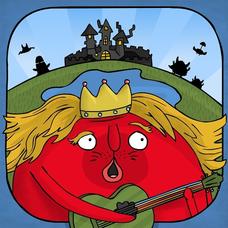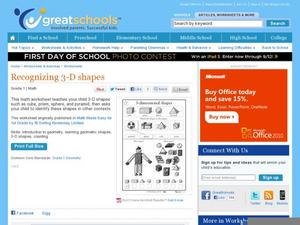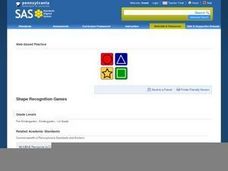Pennsylvania Department of Education
Shapes Around Us
Learners use manipulatives to study shapes. They sort shapes and use correct geometric terminology to describe them. Students find real-life examples of 2 and 3 dimensional shapes, and classify figures in their classroom according to...
Curated OER
Name the 3 Dimensional Shapes of the Objects
Here are six solid figures for learners to identify. The names are listed along the left side and the shapes pictured on the right. Each shape is shown as a familiar object instead of just a drawing. Figures include a cylinder,...
Curated OER
2: Isle of Shapes - Based on the Puerto Rico Quarter Reverse
Learners identify both two and three-dimensional shapes. In this geometric shapes instructional activity, students listen to a teacher led instructional activity about the island of Puerto Rico. They look at the symbols and shapes on...
Curated OER
Shapes and Their Insides
Learners follow a series of instructions for drawing and coloring different shapes in order to learn the difference between the perimeter and area of a polygon. Then they are asked to find the perimeter and area of a 3x4 rectangular...
Curated OER
2-D polygons
A hands-on activity uses the Zome modeling system, and helps young geometers either learn or review their knowledge of polygons. Students build as many different 2-dimensional polygons as possible: triangle, square, rectangle, pentagon,...
Curated OER
3-D Cubes
Students investigate cubes. For this geometric solids lesson, students review geometric concepts previously taught, then logon to a computer game in which they find cube figures and identify the shadow of hidden cubes.
Curated OER
Analyzing 3-D Shapes and 2-D Representations
Students can analyze 3-D objects better with actual physical models and by also drawing 2-D representations of them.
Centre for Innovation in Mamatics Teaching
Area, Perimeter and Volume
Develop young mathematicians' knowledge of two- and three-dimensional shapes with this geometry workbook. From learning about the classifications of different shapes and figures to calculating their area, perimeter, and volume, this...
iMagine Machine
The Land of Venn - Geometric Defense
Young mathematicians use their geometry skills to save the Land of Venn in an engaging math game. A fun way to reinforce children's understanding of basic geometric figures and shapes.
Curated OER
Shape Hunt
Young scholars explore two-dimensional and solid shapes. In this shapes and patterns geometry lesson, students work with a partner to create identifiable objects using tangrams. Young scholars describe the attributes of their shape and...
Curated OER
3-Dimensional Shapes
Where is the vertex? Each of these three-dimensional figures is drawn so learners can see all sides and corners. They examine an example before trying six on their own. Some of these will be tricky, so be sure kids have covered this...
Curated OER
Congruent Polygons: Copying Stretchy Shapes
Third graders investigate congruent polygons through dance. In this congruency lesson plan, 3rd graders do the "brain dance" as a warm up. They review polygon names by singing "The Polygon Chant," before mirroring congruent shapes with a...
Noyce Foundation
The Shape of Things
Investigate the attributes of polygons. A thorough set of lessons presents problem scenarios for elementary through high school classes. The first lessons focus on basic characteristics of polygons, including the line of symmetry. As the...
Curated OER
Classifying Three-Dimensional Shapes
Compare geometric solids based on their properties. Your emergent geometers use spaghetti and marshmallows to build models so they can examine the number of faces, edges, and vertices on polyhedra of their own creation. Resource includes...
Curated OER
Parallel and Perpendicular Lines
Learners study parallel and perpendicular lines. For this parallel and perpendicular lesson, pupils explore 2-D shapes and determine if the sides are parallel or perpendicular.
Curated OER
Tiling Tessellations
Students explore tessellations. In this shapes and geometry lesson, students describe the attributes of many of the shapes displayed on an Elmo. Students create examples of tessellations using pattern blocks.
Arizona State University
Roundup Shapes
Let's study 2-D shapes! Young mathematicians compare and classify shapes according to attributes. They evaluate shape riddles and predict the shape being described. Here is the website where you can find the...
Mathed Up!
Nets, Plans, and Elevations
A dimensional resource teaches viewers to recognize 2-D views of 3-D objects and how to match nets with their 3-D figures. Individuals draw different views of three-dimensional objects including views from the front, side...
Technical Sketching
Introduction — Surfaces and Edges
How different can 3-D and 2-D really be? An engineering resource provides an explanation about the importance of two-dimensional technical drawings. Several samples show how to create multi-view drawings from pictorials and...
Curated OER
Scale Drawing
In this measuring lengths worksheet, students determine which units to use when measuring lengths, estimating lengths, and the errors made when measuring, Students estimate the lengths of each of the lines illustrate to the nearest unit....
Curated OER
Intermediate Matching -- Shapes
Students match the following 10 shapes by drawing a line from their names to their pictures: circle, square, rectangle, cylinder, cube, sphere, oval, triangle, octagon and hexagon. This geometry worksheet provides excellent practice for...
Curated OER
Geometry and Shapes in the X-36
Students describe, draw, and classify shapes. They use the internet to research the X-36 aircraft. Students identify the geometric shapes in the aircraft. They calculate the number of sides in an x-36.
Curated OER
Shape Recognition Games
Students explore shapes. In this math lesson, students identify basic geometric shapes. Students complete activities in which they identify shapes, symbols and letters. Students draw geometric shapes.
Curated OER
Learning Shapes
In this learning shapes instructional activity, students match given shapes to their proper name. In addition, students count the number of shapes identified in a model. Shapes include a rhombus, square, circle, hexagon, trapezoid,...























